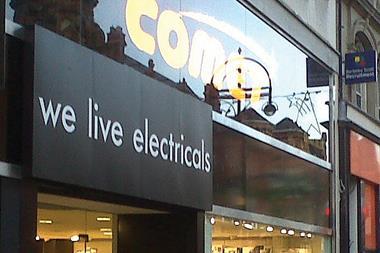Collapsed Comet failed due to a “structurally unsound” sale to OpCapita and its lack of investment in online technology, Dixons Retail chief executive Sebastian James said.
Dixons, which owns electricals retailers Currys and PC World, is in talks with Comet’s administrators Deloitte to buy “half a dozen” Comet shops.
James does not believe there will be a saviour to rescue Comet, expecting the retailer to “disappear in the next few weeks”, said the Daily Telegraph.
But today, would-be white knight Clive Coombes is expected to commence crunch talks with Deloitte, but many believe his efforts are doomed. Comet’s brand and website are likely to be sold, valued at just £1m.
Yesterday, Dixons posted like-for-like sales in the UK and Ireland up 3% in the 24 weeks to October 13 driven by customers buying televisions to enjoy the summer of sport. The retailer has returned to the black in its first half for the first time in five years.
James said he expects the “fire sale” of Comet’s remaining stock to create “disruption” to UK trading but believes Currys and PC World will “benefit from the consolidation” in the sector.
Deloitte has already closed 41 stores and plans to shut another 125 over the next few weeks.
Dixons has hired 171 former Comet full-time staff and another 1,000 Christmas workers.
Commenting on the reasons for Comet’s collapse, James said: “We reacted very, very aggressively to existential shift [in the retail industry]. We focused entirely on that conversation.
“Comet did not pursue that journey, they were better than us when we started [five years ago].”
James added that the sale of Comet by Kesa Electricals to private investment firm OpCapita for £2 last year was “structurally unsound”.
“It didn’t have enough oomph behind it. There was not enough capital, will, desire or push,” he said.


























1 Reader's comment